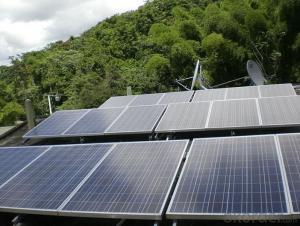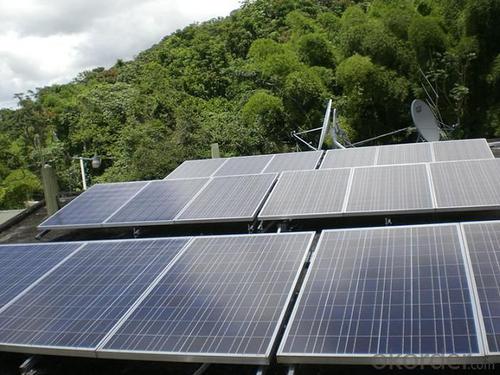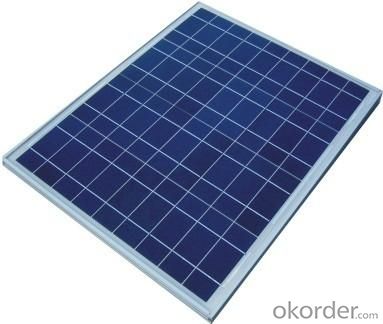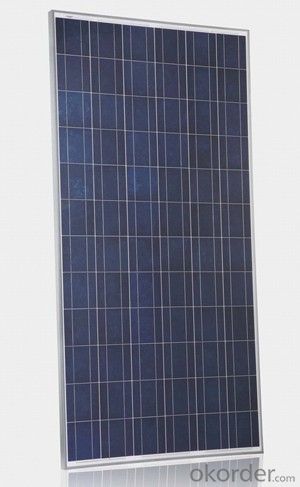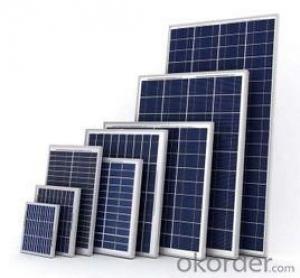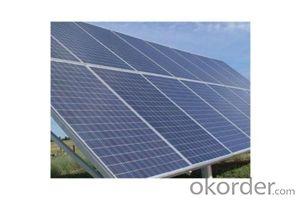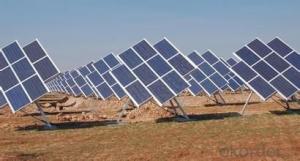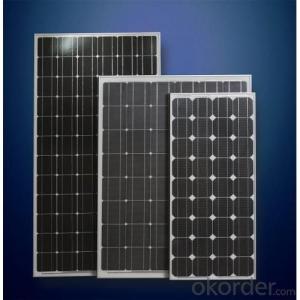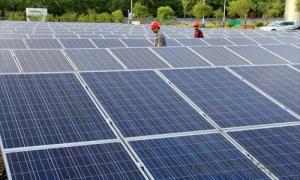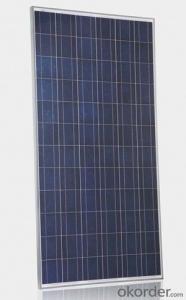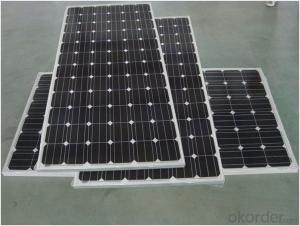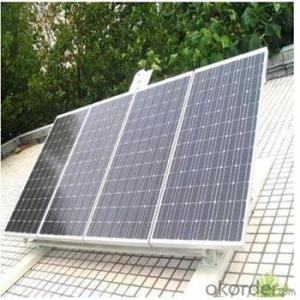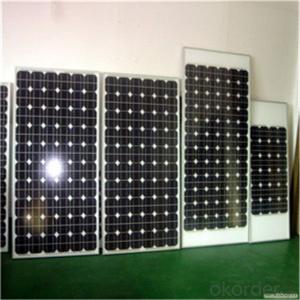Tier One Solar Panels - Monocrystalline Solar Panel Solar Module 55w
- Loading Port:
- China main port
- Payment Terms:
- TT OR LC
- Min Order Qty:
- 100 pc
- Supply Capability:
- 10000 pc/month
OKorder Service Pledge
OKorder Financial Service
You Might Also Like
Quick Details
| Place of Origin: | Zhejiang China (Mainland) | Brand Name: | CNBM | Model Number: | MS-M55(36) |
| Material: | Monocrystalline Silicon | Size: | 760*541*35mm | Number of Cells: | 36pcs |
| Max. Power: | 55w | Appication: | solar power station,home,street light etc. | Cable: | TUV certificate |
| Frame: | aluminium frame | cell size: | 125*125mm mono solar cell | TPT: | Excellent anti-climate TPT with TUV certificate |
| EVA: | Anti-ageing EVA with TUV certificate | Glass: | High transparent low iron tempered glass | cell: | A grade mono cell |
| Junction box: | High quality diode of junction box with TUV certificate | Brand: | Macro-Solar |
Packaging & Delivery
| Packaging Detail: | carton and pallet |
| Delivery Detail: | depend on the quantity |
Specifications
55W mono solar panel solar module
We are manufacturer,can do OEM.
Certified to TUV,CE,ISO9001
Warranty:10 years
55W Solar panel Solar Module
ITEM NO | MS-M55(36) |
Type of cell | Mono |
Maximum power (Wp) | 55W |
Maximum power voltage (V) | 18V |
Maximum power current (A) | 3.05A |
Open circuit voltage (V) | 21.6V |
Short circuit current (A) | 3.29A |
Number of cells (Pcs) | 36 |
Size of module (mm) | 760*541*35mm |
Maximum system voltage (V) | 1000 |
Temperature coefficients of Isc (%) | + 0.1/ °C |
Temperature coefficients of Voc (%) | -0.38/ °C |
Temperature coefficients of Pm (%) | -0.47/ °C |
Tolerance Wattage (e.g. +/-3%) | +/-3% |
Surface Maximum Load Capacity | 60m/s(200kg/sq.m) |
Weight per piece (kg) | 5.0kg |
Junction Box Type | ( TUV ) |
Connectors and Cables Type | (TUV) |
Length of Cables (mm) | 900mm |
Cell Efficiency (%) | ≥15.5% |
Output tolerance (%) | +/-3% |
Frame (Material, Corners, etc.) | Aluminum |
Warranty | 10Years products warranty and 25 years 80% of power |
Standard Test Conditions | AM1.5 100mW/cm2 25°C |
FF (%) | 72% |
Limited Warranty:
10years limited warranty on material and workmanship
25 years limited warrranty of 80% power output
(For detailed please refere to Limited Warranty Certificatd issued by Macro-solar Technology Co.,Ltd)The speicification please find contact us at any time!
- Q: Can the solar panels available be coated with a material (to improve it's looks) and not alter it's efficiency?
- No. The only coatings I am aware of are those that reduce reflection so more light gets through the protective surface to the actual cells. Anything thing that affects appearance is going to be reflecting light back to the viewer and the photons of that light are not available for electricity or heat. If the appearance of the panels offends you, then they need to be concealed by a fence of panels around them that do not throw shadows on the panels.
- Q: Can solar panels be damaged by birds or rodents?
- Yes, solar panels can be damaged by birds or rodents. Birds may build nests underneath the panels or perch on them, causing potential damage to the wiring or scratching the surface. Rodents like squirrels or rats can chew on the wires, leading to electrical issues. Therefore, it is important to take preventive measures such as installing bird deterrents or protective barriers to minimize the risks posed by these animals.
- Q: Solar panels would change the world if they were widely available to us especially cheap, it will be worth it in the long end. Money would be saved like housands a year per person on utility costs.
- Yes, solar panels could change the world if they were especially cheap--but they're not and may not be cheap for many years, if ever. Lots of new technology could change the world but most of it doesn't. The government doesn't have a very good track record of picking winners in the new technology markets; that's something we should probably leave to the venture capitalists to do--with their own money. The money the government spent on solar panels is gone. Racked up as debt that we'll leave to our children and grandchildren to pay off.
- Q: Can solar panels be used for powering a farm or agricultural operation?
- Yes, solar panels can definitely be used to power a farm or agricultural operation. Solar energy can be harnessed and converted into electricity to meet various energy needs in the agricultural sector, such as powering irrigation systems, pumps, lighting, and other machinery. By utilizing solar panels, farmers can reduce their reliance on fossil fuels, lower energy costs, and contribute to a more sustainable and environmentally friendly operation.
- Q: Do solar panels require a battery?
- No, solar panels do not require a battery to function. However, batteries can be used to store excess energy generated by solar panels for use during cloudy periods or at night when there is no sunlight.
- Q: I recently bought a house with very old solar panels (about 25 years old) that don't appear to work properly. They are supposed to heat the hot water heater but they don't always work, and recently have staretd leaking. So, I have had them turned off and now we're just using electricity to heat the hot water. My question is, is there any tax credit money (stimulus or otherwise) available for people to (a) repair old solar panels or (b) replace them with new ones? How does the credit work?
- Congratulations okorder /
- Q: Can solar panels be used in remote areas without access to the grid?
- Yes, solar panels can be used in remote areas without access to the grid. Solar panels generate electricity by harnessing sunlight, and they can operate independently of the grid. This makes them an ideal solution for remote areas where setting up power lines and accessing the grid may be difficult or costly. Solar panels can provide a reliable and sustainable source of electricity in such areas, allowing for various applications like powering homes, schools, clinics, and even small businesses.
- Q: Can solar panels be installed on a historic building?
- Yes, solar panels can be installed on a historic building. However, it is important to carefully consider the impact on the building's aesthetics and historical integrity. Specialized techniques and materials may be required to ensure that the installation is done in a way that preserves the building's unique architectural features. Additionally, it may be necessary to obtain permission or meet certain requirements from local historic preservation authorities before proceeding with the installation.
- Q: OK, so if you put solar panels up on a roof, they are busy turning the sun's energy into electricity. So, does that mean the roof (and therefore the house/structure) stays cooler as well? Or does it still get hot, because . . . I dunno, maybe the panels don't convert all the energy, and the spillover still heats up the building.Any links or URLs to scientific answers would be appreciated, but I don't mind hearing from the Average Joe or (Joelle).
- The type depends upon what you want the solar panels to do. Generate electricity ? Heat gain? Makes a big difference. You should probably get a contractor who specialises in solar panels out to at least start your education on this subject or you could throw a lot of money away on something you don't really need or want.
- Q: Can I use a regulator from a car to regulate the voltage from a solar panel to a battery?
- solar panels will naturally produce a certain DC voltage which is what your battery needs - the current will vary based on the sun light. You need probably 4V to have some over voltage. So based on your specs look at having at least 4 V but not too much over that (tells you how many panels you need in series) I would have blocking diodes (probably the solar cell has them built in) to insure the battery does not discharge thru the panel.
Send your message to us
Tier One Solar Panels - Monocrystalline Solar Panel Solar Module 55w
- Loading Port:
- China main port
- Payment Terms:
- TT OR LC
- Min Order Qty:
- 100 pc
- Supply Capability:
- 10000 pc/month
OKorder Service Pledge
OKorder Financial Service
Similar products
Hot products
Hot Searches
Related keywords
